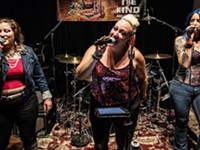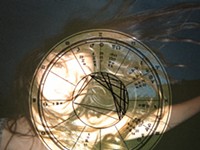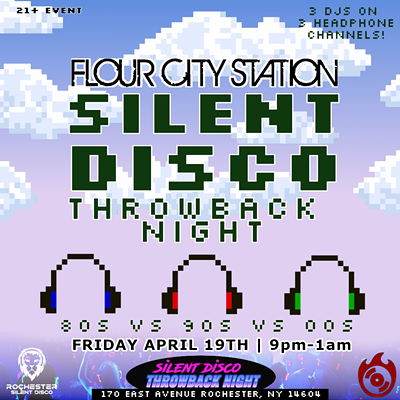[
{
"name": "500x250 Ad",
"insertPoint": "5",
"component": "15667920",
"parentWrapperClass": "",
"requiredCountToDisplay": "1"
}
]
Saxophonist David Newman's nickname may be "Fathead" but the name Ray Charles used to call him --- "Brains" --- is a far better fit. Newman, who pays tribute to his former bandleader on his new CD, I Remember Brother Ray, is among the most soulful sax players of all time.
He may not fill a solo with the most notes, but the ones he chooses never fail to make an eloquent statement.
On I Remember Brother Ray Newman performs the tunes that he helped Charles turn into classics. On "Hit the Road Jack," and "Georgia on My Mind" Newman plays so expressively you'll swear you're hearing Charles sing the songs. These and a lot more will be on the setlist when Newman visits the Montage Grille Thursday night.
Newman has had Charles on his mind since the singer's death last year. It was Charles who plucked Newman from an obscure band in Texas and took him along to make music history. When Charles died, Newman dropped the plans he had for a new album and instead recorded a tribute to his friend.
"I learned so much performing with Ray Charles," says Newman. "I don't know exactly what made it happen, but we seemed to think alike musically. I was able to embellish upon what Ray had already laid out. It just made for a great experience." In the early 1950s Charles was the featured pianist with the Lowell Fulson group. Newman was backing T-Bone Walker with Buster Smith's band. They happened to be on the same bill in Texas one night in 1952.
"We became very close right away," says Newman. "He had just started recording singles. He said he was going to be forming his own band and I told him I'd like to be a part of that. Once he formed the band in 1954, he called me and I went out to Los Angeles and joined him."
Charles' band already had a tenor sax player, so Newman played baritone and alto. But after about a year and a half that sax player left.
"I asked Ray, could I play the tenor chair? Because the tenor saxophone was getting all the solos. He agreed to advance me some money to buy a tenor saxophone and I've been playing tenor since that day."
Newman knew that Charles was destined for stardom, but not right away.
"He was so exceptionally talented and everything he did was going over so well," he says. "But it wasn't until he came into his own voice that we knew he was going to be great. Because in the beginning he was sounding like his influences, Nat King Cole and Charles Brown. He hadn't yet acquired his own identity, his own voice."
Newman doesn't think Charles' blindness was ever an issue. In fact, he believes it contributed to heightening his other senses. He saw evidence of that when he taught Charles how the pieces moved in chess; once Charles mastered the game, Newman was never able to beat him.
Charles had a chessboard built with holes in it, Newman explains. The pieces had prongs on them and Charles could feel and tell where each piece was located without knocking them over. "I asked him, how was it I was never able to beat him when I taught him how to play the game? He told me it was his power of concentration. He didn't have the distractions like pretty women that I would have."
But Newman and Charles did encounter a great deal of racial prejudice while they traveled together in the mid-'50s until the early '60s --- especially in the South.
They hit trouble in hotels that wouldn't put them up and restaurants that wouldn't serve them.
"Those things were distractions; it wasn't very good," he says. "But the music was so great, people were accepting the music and we didn't concentrate on that too much. We put that in the back of our minds and proceeded to go forward. In Georgia one time Ray refused to perform because they had a separated audience. He was banned for a certain period of time. Later they changed it and gave him the key to the city."
Charles arranged for Newman to record his first solo album --- and played piano on it --- in 1958. Since then Newman has recorded a steady stream of albums as a leader.
But when he left Charles' band in 1964 he also became one of the busiest sidemen in jazz, blues, and r&b. He's played on hundreds of albums by performers like Herbie Mann, Aretha Franklin, B.B. King, and Eric Clapton.
So, after all of this excellent work, why on earth is he called "Fathead"?
"In high school, after I played a march a couple of times I remembered the composition and I didn't have to read it. The band leader wanted to make sure I was reading the music, so I put the music on the stand, but it was upside down. He knew that my reading skills were good, but they weren't that great where I could read upside-down. So he bumped me on the head and called me 'Fathead.'"
David "Fathead" Newman plays Thursday, May 26, at the Montage Grille, 50 Chestnut Street, at 7 and 9 p.m. $20 in advance, $23 day of show, $40 VIP. 232-1520, www.montagegrille.com
Speaking of David “Fathead” Newman, Ray Charles
-
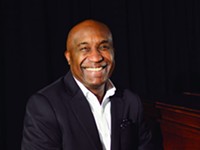
Bobby Floyd is a piano player’s piano player
Feb 14, 2018 - More »
Latest in Music Features
More by Ron Netsky
-
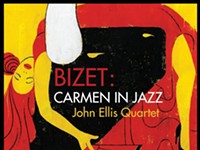
Album Review | 'Bizet: Carmen in Jazz'
Mar 26, 2024 -
'To Swing Is the Thing" by Mike Melito
Aug 10, 2023 - More »

